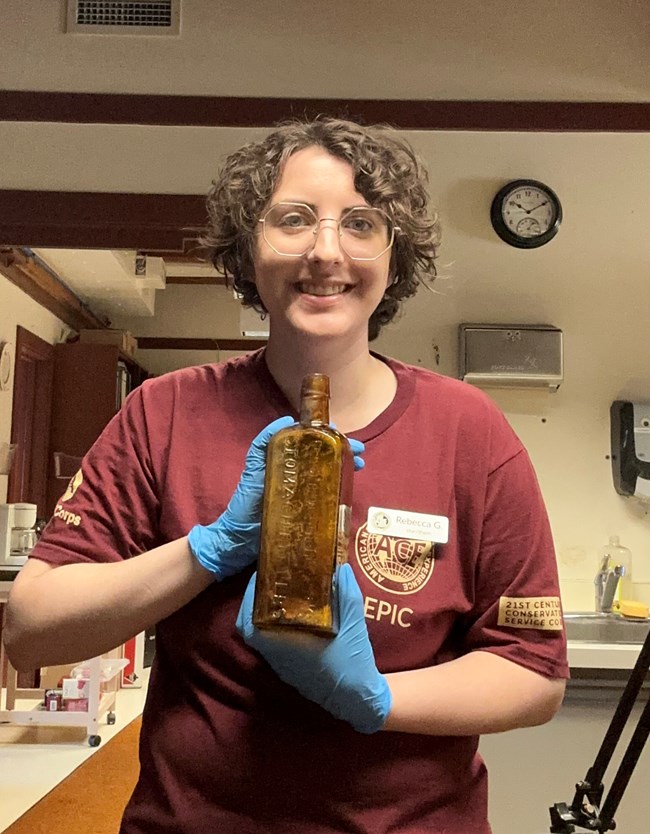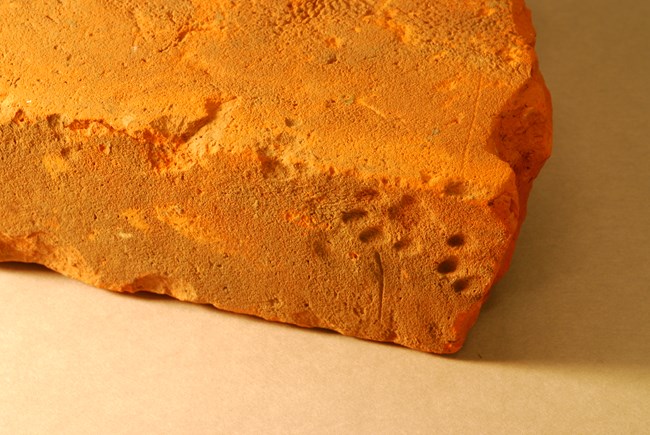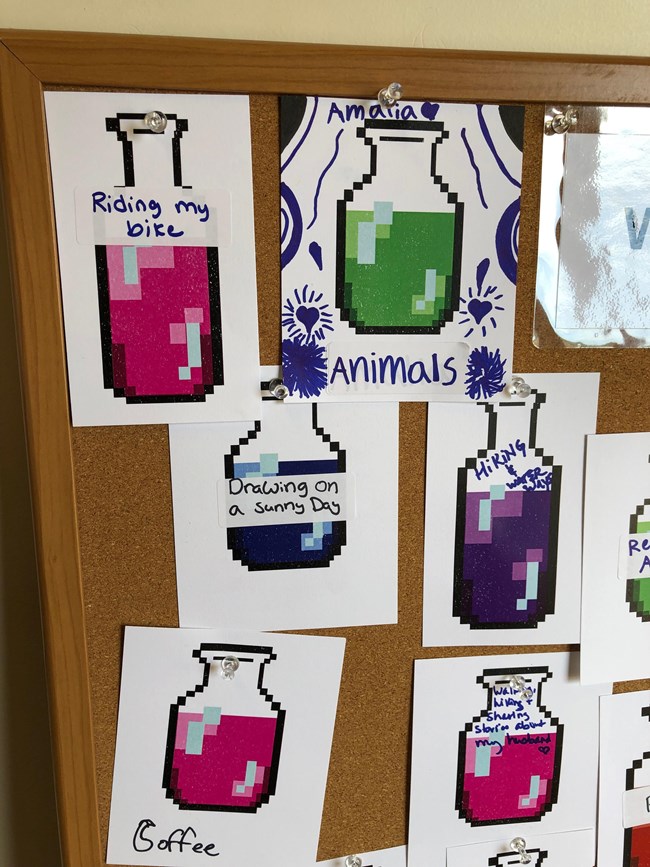Last updated: August 25, 2023
Article
American Conservation Experience Intern Rebecca Gillespie shares her experience at Fort Vancouver National Historic Site

NPS Photo / M. Huff

NPS Photo / R. Gillespie
An Oregonian, Rebecca previously attended Portland State University and the University of Glasgow studying anthropology and archaeology. As a Collections Assistant Intern, Rebecca worked with archaeological artifacts from Fort Vancouver National Historic Site's museum collection, processed archival collections, helped create new exhibits, and hosted four public programs, called "Cultural Resources Curiosity Labs," that connected visitors to archaeological and historic artifacts. This internship wasn't Rebecca's first time at Fort Vancouver National Historic Site - she had also participated in the site's Public Archaeology Field School in 2013! As Rebecca concluded her 11-week internship in August 2023, we asked her to share some of her experiences here and her advice for future interns.
What inspired you to apply for this internship?
Well, I've loved museums since I was very young, and as I advanced in my studies in college, I discovered that I really wanted to work with artifacts in particular. I've been attempting to put my foot in the door to hopefully find a career in a museum space for a few years now, so when I saw this internship, it felt like a perfect fit. Not only was it in a museum and helping with collections, but it was in a location I had been to before - albeit as an archaeology field school student at the time.
What was your favorite project or part of the internship?
That's a hard question, there were so many parts I enjoyed, honestly! Even the more repetitive tasks were fun to me in their own special way. I actually really loved the opportunity to make the museum label for the "Gelatine" airship [at Pearson Air Museum], and coming up with ideas and executing the Curiosity Labs was a wonderful experience. I still adore collections, but being able to experiment with a variety of tasks helped me realize that I really enjoy the more creative aspects like programming and label making too.
What advice would you give to someone considering applying for an American Conservation Experience internship at a National Park Service site?
Make sure that you're interested in some form of conservation work, and don't be afraid to switch gears! Like a lot of organizations and jobs, priorities can always change, and I think if you go into it eager to learn and open to being flexible, it's a wonderful opportunity and you can add a ton of knowledge to your repertoire.
Going into the internship with an open mind and ready to absorb information is probably the best advice I could give, and don't be afraid to ask questions!
What interests you about working with museum collections?
There's something special about dealing with items from the past - everything has a story, and it often makes you wonder a lot about the person the objects originally belonged to in the past. It's also wonderful to be a part of the conservation efforts to help maintain these historic items, as well as making them easier to access by aiding with the cataloging and organizational process.

NPS Photo / Fort Vancouver National Historic Site
Did you have a favorite artifact you encountered during your internship?
That's a tough one! I honestly don't know if I could pick a single one. The Roman brick with the cat paw print is of course a fantastic artifact with such an interesting history. I also loved the floral embroidered section of a dress that was saved. The craftsmanship on the embroidery is so lovely, and I can definitely understand why it was saved even when separated from the dress itself! I think the third neat artifact was actually the experimental World War I helmet [in the park's museum collection], I never knew those existed and I loved how unique and medieval it looked.
Did you learn anything that surprised you?
A few things, for sure. I was surprised at the extent of collections Fort Vancouver had, and how much from other parks was being stored here.
What do you think is important for people to know or understand about the museum collection at Fort Vancouver National Historic Site?
I think some people may not know how incredibly diverse the collection is at Fort Vancouver. There are a lot of voices here within the 1800s alone, but even expanding beyond into the first half of the 20th century. It really gives a unique perspective of the community that came and went in this area of Washington, and I think there's a great potential to bring in more visitors with those particular stories.

NPS Photo / M. Huff
What skills have you learned during your internship that will help you pursue your career goals?
So many, honestly. I learned some information about artifact management, organizing and cataloging. I learned about exhibit labels, about deaccessioning and some starting points on archiving. Though I have to say one of the more surprising things I learned had to do more with trusting my voice and creativity. The Curiosity Labs were a great test for me, as it gave me some room to test my creative skills with activities and ideas to explore.
I learned to trust more of my process, but it also was a wonderful opportunity for a learning experience. I learned when my ideas were too costly or ambitious, when I would get too wordy with visitors, and how to approach a topic with the right amount of information depending on the age of the visitor I was speaking to at the moment. The learning process also involved a lot of immediate mental note taking as far as what locations and circumstances impacted visitor engagement and turnout.
I think this type of critical thinking would help in a number of different career paths, but if I plan to pursue a career in a museum space, learning about audience interaction and engagement and being able to quickly adjust to those needs is incredibly helpful.
What's next for you?
That's definitely the million dollar question. I am really hoping to get into some type of museum or interpretation space if I can. I think I would still love to do work in ocllections in some capacity, but while here I learned that I really like programming and displays.
I will say that this internship also made me even more curious about the process of conservation and restoration work. I'll definitely have to do more research into this, but I'm very invested in that field after learning a little bit more during my time here. Overall I had a wonderful time, and everyone here has been incredibly friendly and welcoming - the park rangers, staff, and volunteers are all delightful. I can't thank Curator Meagan Huff and Cultural Resources Program Manager Tessa Langford enough for all their help, the opportunities they provided to me, and the many, many questions they answered.
Whatever is next for me, I want to definitely keep in contact. Fort Vancouver was an incredibly supportive environment throughout my internship, and you can tell that everyone that works here really cares about not just the site, but the work that they do. I will continue to send all my best wishes and support in whatever way I can for their continued success.
The staff at Fort Vancouver National Historic Site are grateful for Rebecca's participation in this summer's American Conservation Experience internship, and all her work here. Thank you, Rebecca!
